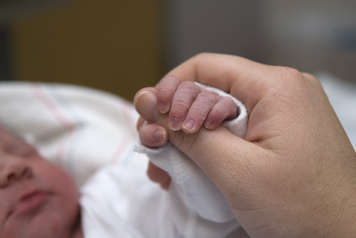Your baby's delicate skin and nails will need special care right from birth. While they do not have teeth yet, it is not too early to start a dental care routine.
Looking after your child's skin and nails
Skin care
A baby’s skin is much thinner and more fragile than adult skin, so you should care for it differently.
- Bathe your child gently with a mild soap in warm water for five minutes. You can use the same soap to clean their scalp.
- After bathing, apply a gentle moisturizer all over the skin and a protective cream on the diaper area to prevent diaper rash.
There are no preferred brands for cleaning or moisturizing your child's skin. The most important thing is that the products you use are mild and as fragrance-free as possible.
Nail care
Babies play with their hands and can scratch themselves with their nails, even if they are extremely thin and tiny.
- Keep your baby's nails short and clean.
- You can cut them with blunt scissors or with a baby nail clipper, making sure you avoid the skin on the finger pads.
- As babies' nails grow faster than adult nails, you will need to trim them every one or two weeks.
Dental care
- Your newborn baby should not have any teeth yet, but it is still a good time to begin a dental care regimen. Wipe a newborn baby's gums with a soft, clean, damp cloth after feeding.
- At age three months, begin cleaning your child's mouth after every feeding. Lay your baby in a comfortable place and gently wipe their gums with a clean, damp washcloth.
- As soon as your child's teeth poke through the gums, you and your child should clean them with a soft toothbrush without toothpaste to keep them strong and healthy. Do this a couple of times per day: after the first and last feedings.
Some newborn babies are born with one or two teeth. If this is the case for your baby, make sure to brush their teeth with a soft baby toothbrush. Do this a couple of times per day: after the first and last feedings.
Prevent early childhood cavities
Promoting good habits early will help reduce the development of tooth decay later.
Do not let your child fall asleep:
- on the breast while breastfeeding
- while sucking a bottle of formula, milk, juice or any other liquid besides plain, unsweetened water
- while using a sippy, sprout or straw cup
Clean your baby's teeth after you breast or bottle feed them. If your baby tends to fall asleep after the last breast or bottle feeding, gently clean their teeth and gums just before the last feeding.
- As your baby gets older, do not let your child walk around with a training cup or bottle full of sweetened water, juice or milk.
- If your child uses a pacifier, do not dip it in anything sweet. Give your child a plain pacifier instead.
